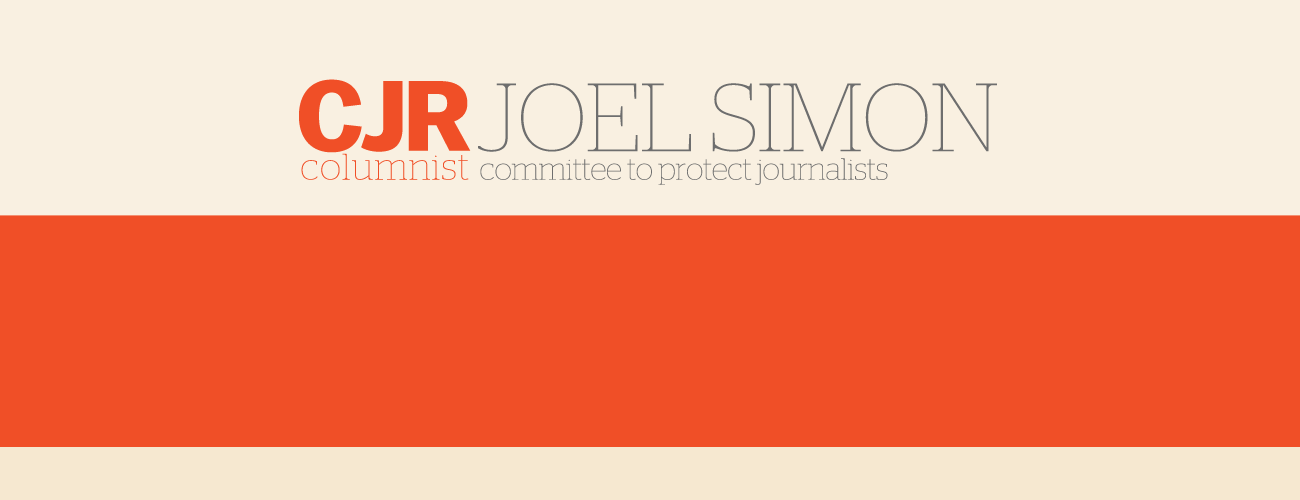Sign up for The Media Today, CJR’s daily newsletter.
A military court in Cameroon on April 21 sentenced journalist Ahmed Abba to 10 years in prison and ordered him to pay court costs totaling nearly a hundred thousand dollars, an impossible sum in the impoverished Central African nation. Abba, the correspondent for Radio France Internationale’s Hausa service, has already spent nearly two years in detention in reprisal for his reporting on security and human-rights issues in the country’s north, where Boko Haram maintains an active presence. He was convicted on the nonsensical charge of “non-denunciation of terrorism.” As terrible as this was, it could have been worse. Abba was facing the death penalty.
Still, with the conviction, the government of President Paul Biya sent a clear message, a message reinforced by the jailing of at least seven other Cameroonian reporters; the shuttering of dozens of newspapers and broadcasters; the shutdown of the Internet for three months following protests in the English-speaking area of the country; and restrictrictions on access to the international media. Cameroon does not want witnesses.
International observers also have been blocked. The Committee to Protect Journalists received assurances earlier this year from the Information Ministry that it would be given access to the country to investigative press-freedom conditions. But visas have not been granted.
These government actions have created a deeply chilling environment for the media in Cameroon that has stifled reporting on the country’s ongoing political crisis. Tensions have been steadily building between those regions formerly governed by the French, and the anglophone territories in the nation’s northwest and southwest that were once part of a British colony. Alleging a history of discrimination and repression, many leaders in English-speaking regions of Cameroon are calling on Biya’s administration to grant increased autonomy. Some want total separation. Demands and demonstrations led by anglophone communities have been met with violence and intimidation, arrests, and attacks on the press.
At a time when the world’s attention is focused on global hot spots like Syria and North Korea, the situation in Cameroon can appear as an afterthought. But with neighbors like the Central African Republic and the Republic of Congo, a political crisis in Cameroon could further destabilize an already volatile region ravaged by decades of war. The Cameroonian media is the world’s eyes and ears; without their reporting, the world is blind to the risks.
A new study published in February that examined killings of journalists around the world over the last few decades found that the murder of even a single journalist in a country without a history of media violence is a precursor to increased political instability and repression. The circumstances in Cameroon are different—journalists are being jailed, not killed (although an investigative reporter, Denis Nkwebo, was nearly blown up in a 2014 car bombing). However, the same logic applies. No media attention translates into little global awareness and a free hand for the country’s increasingly authoritarian leader.
Cameroon should be an important global story, but that’s not happening because local reporters are stifled. Aside from Abba—a critical voice covering the country’s restive north for a global audience—other international reporters in Cameroon have also been harassed and detained, including the BBC correspondent Randy Joe Saah. The government has also railed against social media, which is critical for creating global awareness. Last November, the government-run daily newspaper The Cameroon Tribune described social media as “fast becoming a threat to peace and a secret instrument of manipulation.”
Aside from the concerted efforts of the Biya government, a number of critical factors are conspiring to keep Cameroon off the international agenda. The first is simply the lack of media resources on the continent. Outside of the wires, the US media has only a few full-time correspondents in all of West and Central Africa. The second is the dysfunction in the US State Department, which aside from the inevitable challenges of a political transition has seen a huge turnover in experienced diplomatic personnel; a failure to acknowledge a link between human rights and national security; and focus on security and fighting terrorism at the expense of nearly all other interests.
Given this information vacuum, international media organizations have an obligation to ensure robust coverage of the Cameroonian crisis. This will not be easy, given the government’s efforts to shut down critical media in the country. But with Cameroonian journalists facing jail and repression, international journalists need to find a way to tell the country’s story. If media repression is the harbinger of broader human rights violations and political instability, then Cameroon is on the brink.
Has America ever needed a media defender more than now? Help us by joining CJR today.



